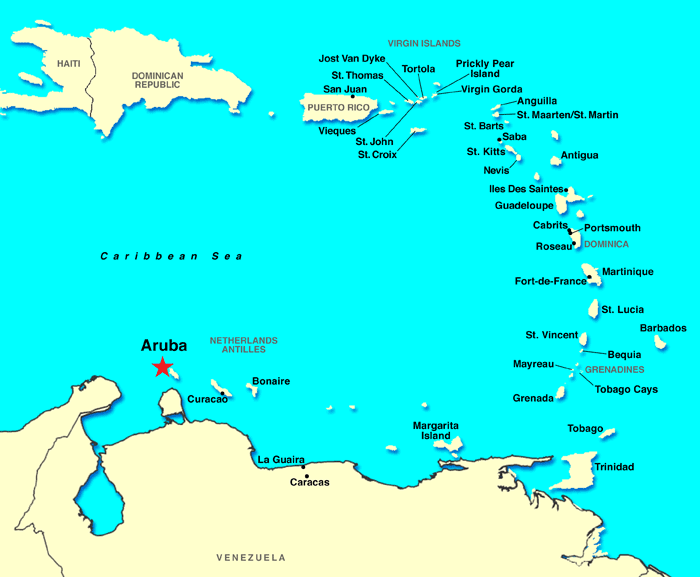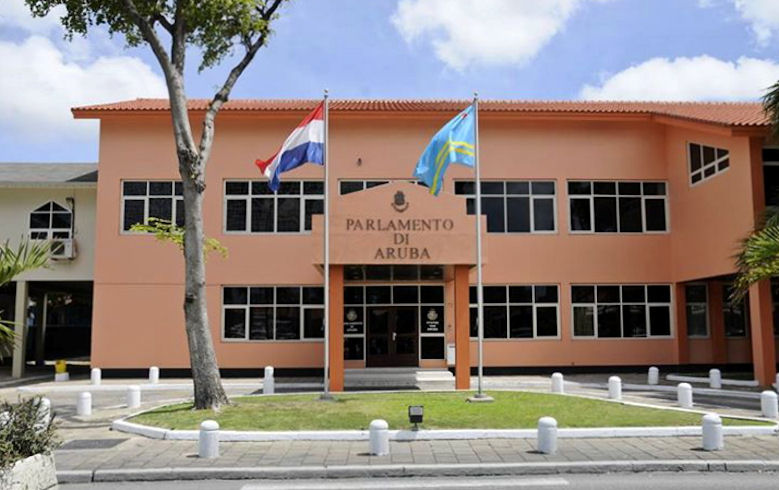
An Aruba Tax Exempt Company (AVV) is a corporation with limited liability. Perfectly suited for foreigners. The AVV law was enacted in 1988 and is very popular with foreigners involved with international business activities. An AVV is totally exempt from all taxes pertaining to certain business activities.
AVV is the abbreviation of the official Dutch corporation “Aruba Vrijgestelde Vennootschap”.
Background
Aruba is an island nation which used to be part of the Netherland Antilles until 2010 when it joined the Kingdom of the Netherlands. It is located in the Caribbean Sea near Venezuela.
Its political structure amounts to a democratic elected parliament under the Dutch monarchy.
English is one of its three official languages along with Dutch and their native Papiamento.
Benefits
An Aruba Tax Exempt Company (AVV) has the following benefits:
• Complete Foreign Participation: Foreigners may own all of the shares in an AVV.
• Tax Exemption: Several international qualified business activities are tax exempt from all taxes. However, U.S. taxpayers and others paying taxes on global income must declare all income to their governments.
• One Shareholder: Only one shareholder is required to form an AVV.
• Privacy: The names of the shareholders are not included in public records.
• Low Minimum Capital: The minimum authorized share capital is $6,000 USD.
• English: English is one of its three official languages

Aruba Tax Exempt Company (AVV) Name
An AVV must select a company name not resembling another legal entity’s name in Aruba.
The abbreviation “AVV” must appear at the end of its company name.
Limited Liability
Shareholders are not personally liable for actions by the AVV towards third parties.
Registration
An Aruba civil law notary first makes an application for a Certificate of No Objection from the Ministry of Justice. This involves filing a Draft Deed of Incorporation for approval. After receiving the certificate, the notary then files an original, signed, and notarized Deed of Incorporation with a copy of the Articles of Incorporation with the Aruba Chamber of Commerce Trade Registry office. Upon filing, the AVV becomes a legal entity.
Both the Deed of Incorporation and the Articles of Incorporation can be written in Dutch, English, or the native Papiamento which are the three official languages in Aruba.
AVV’s must also file for a business license even if they do not intend to engage in local business. The business license is ready and available in case an AVV decides to conduct business in Aruba.
Deed of Incorporation
While the word “deed” implies transferring legal title to another person or legal entity this is not the case with an AVV. Probably the translation from Dutch to English used the word “deed” instead of a “Memorandum of Association” used in many countries to summarize the Articles of Incorporation.
The Deed of Incorporation provides:
• The Articles of Incorporation as an attachment;
• The name of the incorporator along with residential address, country of birth and birth date;
• The director(s) names and addresses;
• The types of shares to be issued and amounts; and
• Identity of the shareholders including legal entities and natural persons.
Articles of Incorporation
This document explains the company’s purpose and how it operates. The rights of the different classes of shareholders, powers and duties of the managers and officers, distribution of income (retained or dividends, etc.), appointments, compensation and removal of personnel, and how the company dissolves.

Rules and Regulations
Besides the two above-mentioned legal documents, the company’s bylaws are an option. The bylaws are the company’s rules and regulations for the operation of the company.
After registration, the shareholders approve the bylaws which must be filed with the Aruba Chamber of Commerce Trade Registry office. However, the bylaws are not available for public inspection.
Directors
The AVV is represented by its managing directors. All of the managing directors can be natural persons or legal entities from other countries and not residing in Aruba.
Legal Representative
At least one local, licensed legal representative must be appointed. The legal representative is not a managing director.
The legal representative is an Aruba corporation (NV) which is licensed to provide services including the representation of AVV’s.
Shareholders
A minimum of one shareholder is required to form an AVV. Shareholders can be natural persons who are citizens of any country and residing outside of Aruba. Shareholders also can be legal entities registered or incorporated in other countries.
An AVV can issues shares as with or without par value and with or without voting rights (as long as one voting share is issued and remains outstanding).
Minimum Capital
The minimum required share capital is $6,000 USD. At least $1 USD must be issued and remain outstanding at all times.
Registered Office
Every AVV must maintain a local registered office.
The required legal representative mentioned above also serves as the local registered agent whose office address may be uses as the AVV’s registered office.
Taxes
An AVV can be a tax exempt company depending upon the types of business activities it engages in. AVV’s cannot conduct any commercial activities inside Aruba.
Currently, the normal corporate tax rate in Aruba is 25%. If an AVV engages in non-exempt business activities, it will pay the 25% corporate tax rate on those profits.
An AVV must file a corporate income tax return every year even if all of its profits are tax exempt.

Tax Exempt Activities
The following business activities are completely tax exempt:
• Passive Investments – typical asset management portfolio investments;
• Holding Company – an exempt company can hold the shares of a foreign company located in a country having a corporate tax rate of at least 12.5% (half of the current Aruba corporate tax rate of 25%). Since most countries tax their corporations at a rate higher than 12.5% this should not be a problem. However, an exception exists when dividends are received from a non-qualified legal entity amounts to less than 5% of the total dividends received in the same fiscal year.
• Trading Shares – the trading of corporate shares is permitted.
• Financing – as long as the company is not a credit institution. Financing includes amongst others cash management, leases, and hedging.
• Licensing Intellectual Property Rights – this includes income from royalties and usage rights.
• Real Estate Investments in other countries;
Other activities not mentioned above are subject to the typical 25% corporate tax rate.
Note: U.S. taxpayers and all others subject to worldwide income taxes must report all income to their tax authorities.
Accounting
While a yearly corporate tax return is mandatory, the AVV can be exempt from filing annual financial statements if the Deed of Incorporation states so. AVV’s are not required to publish its annual accounts.
Annual General Meetings
An annual general meeting of shareholders is required but can be held anywhere in the world.
Public Records
The names of the shareholders are not included in any public records.
Time for Incorporation
It may take up to five business days for the incorporation process to complete.
Conclusion
An Aruba Tax Exempt Company (AVV) takes advantage of the following benefits: total ownership by foreigners, complete tax exemption, privacy, one shareholder, low minimum share capital required, and English is one of its three official languages.


